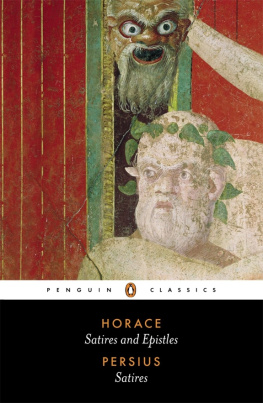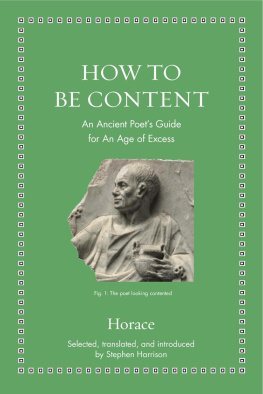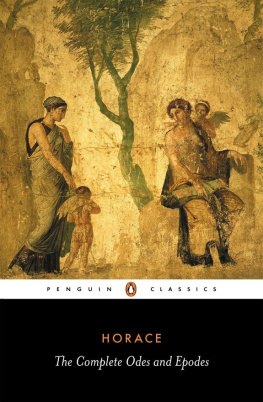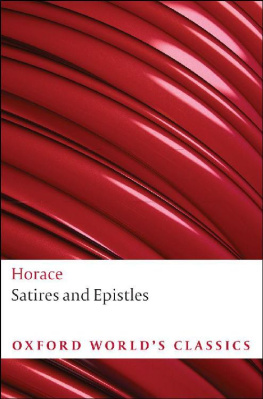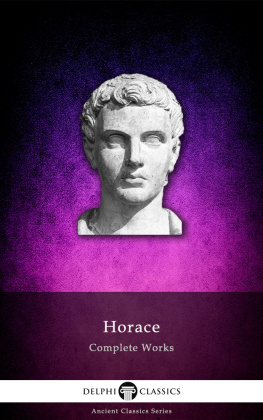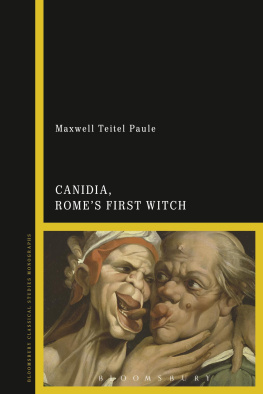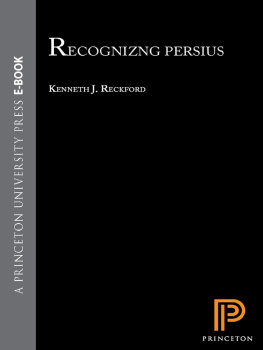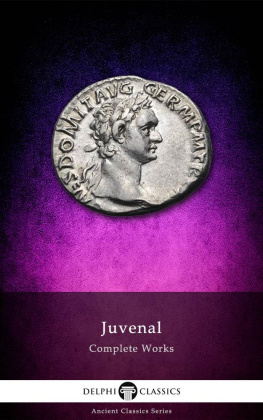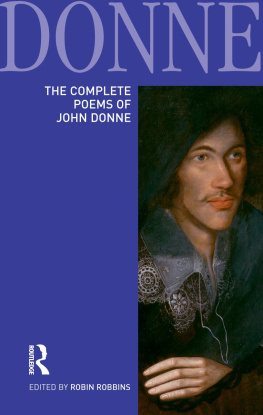
HORACE PERSIUS
Advisory Editor: Betty Radice
QUINTUS HORATIUS FLACCUS was born in 65 BC at Venusia in Apulia. His father, though once a slave, had made enough money as an auctioneer to send his son to a well-known school in Rome and subsequently to university in Athens. There Horace joined Brutus army and served on his staff until the defeat at Philippi in 42 BC. On returning to Rome, he found that his father was dead and his property had been confiscated, but he succeeded in obtaining a secretarial post in the treasury, which gave him enough to live on. The poetry he wrote in the next few years impressed Virgil, who introduced him to the great patron Maecenas in 38 BC. This event marked the beginning of a life-long friendship. From now on Horace had no financial worries; he moved freely among the leading poets and statesmen of Rome; his work was admired by Augustus, and indeed after Virgils death in 19 BC he was virtually Poet Laureate. Horace died in 8 BC, only a few months after Maecenas.
AULES PERSIUS FLACCUS was born in AD 34 in Etruria. Rich and well connected, he knew Lucan, Thrasea Paetus, and other members of the Stoic opposition to Neros rule. His friendship with the philosopher Cornutus began when he was sixteen and remained a strong influence until his death at the age of twenty-seven. Although the satires are concerned with moral questions a fact which endeared Persius to the Church Fathers and won him admiration in the Middle Ages and Renaissance their main interest for us lies in their condensed, allusive, and highly metaphorical style.
NIALL RUDD is a graduate of Trinity college, Dublin. After lecturing in England during the fifties, he moved to Toronto where he wrote a book on Horaces satires. Back in England, as professor of Latin at Bristol, he published translations (including Juvenals Satires), commentaries (Horaces Epistles II and Ars Poetica) and literary studies (Lines of Enquiry and The Classical Tradition in Operation). Recently he has collaborated with R. G. M. Nisbet on a commentary on Horace, Odes III, and has prepared a text, translation and brief notes on Dr Johnsons Latin poems. He is now attached to the Department of English at Liverpool University.
HORACE
Satires and Epistles
PERSIUS
Satires
A verse translation with an Introduction and Notes by NIALL RUDD
PENGUIN BOOKS
PENGUIN CLASSICS
Published by the Penguin Group
Penguin Books Ltd, 80 Strand, London WC2R 0RL, England
Penguin Group (USA) Inc., 375 Hudson Street, New York, New York 10014, USA
Penguin Group (Canada), 10 Alcorn Avenue, Toronto, Ontario, Canada M4V 3B2
(a division of Pearson Penguin Canada Inc.)
Penguin Ireland, 25 St Stephens Green, Dublin 2, Ireland
(a division of Penguin Books Ltd)
Penguin Group (Australia), 250 Camberwell Road, Camberwell, Victoria 3124, Australia
(a division of Pearson Australia Group Pty Ltd)
Penguin Books India Pvt Ltd, 11 Community Centre,
Panchsheel Park, New Delhi 110 017, India
Penguin Group (NZ), cnr Airborne and Rosedale Roads, Albany, Auckland 1310, New Zealand
(a division of Pearson New Zealand Ltd)
Penguin Books (South Africa) (Pty) Ltd, 24 Sturdee Avenue, Rosebank 2196, South Africa
Penguin Books Ltd, Registered Offices: 80 Strand, London WC2R 0RL, England
www.penguin.com
This translation of The Satires of Horace and Persius first published 1973
Revised edition, with Horaces Epistles, published 1979
Reprinted with revisions 1987
Reprinted with revisions 1997
Reprinted with revisions 2005
1
Copyright Niall Rudd, 1973, 1979, 1997, 2005
All rights reserved
The moral right of the translator has been asserted
Except in the United States of America, this book is sold subject to the condition that it shall not, by way of trade or otherwise, be lent, re-sold, hired out, or otherwise circulated without the publishers prior consent in any form of binding or cover other than that in which it is published and without a similar condition including this condition being imposed on the subsequent purchaser
EISBN: 9781101491508
Contents
Foreword to the Second Edition
This volume contains a revised version of the Satires of Horace and Persius. Although the basic sense has been changed at only half a dozen points, the rhythm has been made more regular by a reduction in the number of unstressed syllables.
For the sake of completeness a new translation of Horaces Epistles has now been included, and there have been consequential additions to the introduction, notes, bibliography, and index.
NR,
Bristol, 1979
Foreword to the 1997 Edition
The chronology of Horace, Epistles II and Ars Poetica has been brought into line with the view adopted in my commentary (1989). The text employed is still eclectic. Some fifty changes have been made in the translation for reasons of sense or rhythm. The bibliography has been brought up to date.
NR,
Bristol, 1996
Foreword to the 2005 Edition
Extensive changes have been made to produce a smoother and lighter versification. A few mistakes have been corrected; other areas remain largely the same.
NR,
Liverpool, May 2004
In memory of Betty Radice
Introduction
SATURA BEFORE HORACE
First a point of semantics. When the critic Quintilian, writing at the end of the first century AD, said that satura was entirely Roman (satura quidem tota nostra est), he was referring to a specific genre of poetry, not to what we might call the satiric spirit. The latter, as one would expect, is found in many areas of Greek literature, for example, the Homeric parodies, the lampoons of Archilochus, Aesops fables, the comedies of Aristophanes, and Lucians dialogues. It also occurs in a number of Roman writers who are not satirists, notably Lucretius, Ovid, and Tacitus. Conversely, satura, though usually in some sense satirical, is not invariably so. With Horaces description of his education (I. 6. 6588), Persius acknowledgement of his debt to Cornutus (5. 2651), and Juvenals passage on human sympathy (15. 13158) we are given a respite from the ridicule of folly and vice.
The derivation of satura is uncertain. Some scholars would connect it with the Etruscan satir, which is supposed to mean speak, but the common view, which was certainly held by the Romans themselves, sees it as the feminine singular of satur, meaning full. Satura, therefore, meant a full, and saturae fulls. There is nothing odd in talking about fulls. In the days before bottles became part of our national refuse everyone knew what was meant by taking back the empties. But the noun understood with satura was not a bottle. Originally it was a dish (lanx), the lanx satura being a dish full of first fruits offered to the gods.
This, at any rate, is the most likely of the explanations offered by Diomedes, a grammarian of the fourth century AD.containing a number of different provisions. But the combination lex satura is not found. What we do get, in connection with legal and political acts, is the phrase per saturam (literally through a medley), which presupposes that satura itself already meant a medley; (3) that satura is derived from satyri, the wild and lustful attendants of Bacchus who are still to be seen in museums, chasing nymphs around the rims of Greek vases. This is etymologically impossible, though later the two roots became intertwined.
Next page
